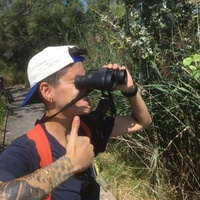
BSc, MSc
Research PG
- About
-
- Email Address
- l.dunan.19@abdn.ac.uk
- Office Address
Office 216
School of Biological Sciences,
University of Aberdeen,
Tillydrone Avenue,
Aberdeen,
AB24 2TZ, UK- School/Department
- School of Biological Sciences
Biography
Currently in her 2nd year PhD at the University of Aberdeen. Lana is co-supervised by Dr Greta BOCEDI and Dr Lesley LANCASTER. She is part of Dr Greta BOCEDI's Research group studying ecological, evolutionary and eco-evolutionary dynamics of species adaptations and behaviours in space and during environmental changes, their consequences for population dynamics, persistence and diversification, and for species’ responses to rapid environmental changes.
Past Studies :Lana completed a bachelor’s degree in “Life and Health Science – Specialty Organism Biology and Environment”, followed by a more specific master’s degree in “Life and Health Science – Biology and Environmental Health – Specialty Plant Protection and Agro-environment” in France.
Past Experiences :
1. Research internship - Pushed and pulled invasions in heterogeneous landscape -
Research team Biology of Introduced Populations, Sophia Agrobiotech, FRANCE.Supervised by Dr Elodie VERCKEN
2. Research internship - Are essential oils potential biopesticides against aphids, crop pests ? -
Research team Community Ecology in Agrosystems, Sophia Agrobiotech, FRANCE falling within the STomP (Sustainable Tomato Production) project.Supervised by Dr Anne-Violette LAVOIR
3. Laboratory Technician - as a continuation of Are essential oils potential biopesticides against aphids, crop pests ? -
Research team Community Ecology in Agrosystems, Sophia Agrobiotech, FRANCE falling within the STomP (Sustainable Tomato Production) project. - Research
-
Current Research
Project Title :
Unravelling the joint evolution of dispersal and mating behaviours in spatially-structured populations using experimental evolution.Dispersal and mating systems are both fundamental processes in determining a species’ evolutionary potential. Mating systems by reshuffling the already present genetic variation can shape how genetic diversity will be transmitted over time and dispersal by promoting gene flow across space can strongly influence populations’ genetic diversity, persistency and probability of extinction.
Dispersal, as well as polyandry (a mating system where females mate with multiple males) have load of studies supporting that their evolution can be driven by inbreeding avoidance. However, we still do not know how these two behaviours affect each other’s evolution and what is the feedback on the population's inbreeding level.Aims :
This project aims at establishing, experimentally, the role of dispersal in the evolution of polyandry and how dispersal and polyandry affect each other’s evolution and how this interaction feeds back on the population’s inbreeding level and inbreeding depression.Biological Model :
This will be achieved through an experimental evolution approach using the model system Callosobruchus maculatus.Funding and Grants
PhD funded by The Royal Society
